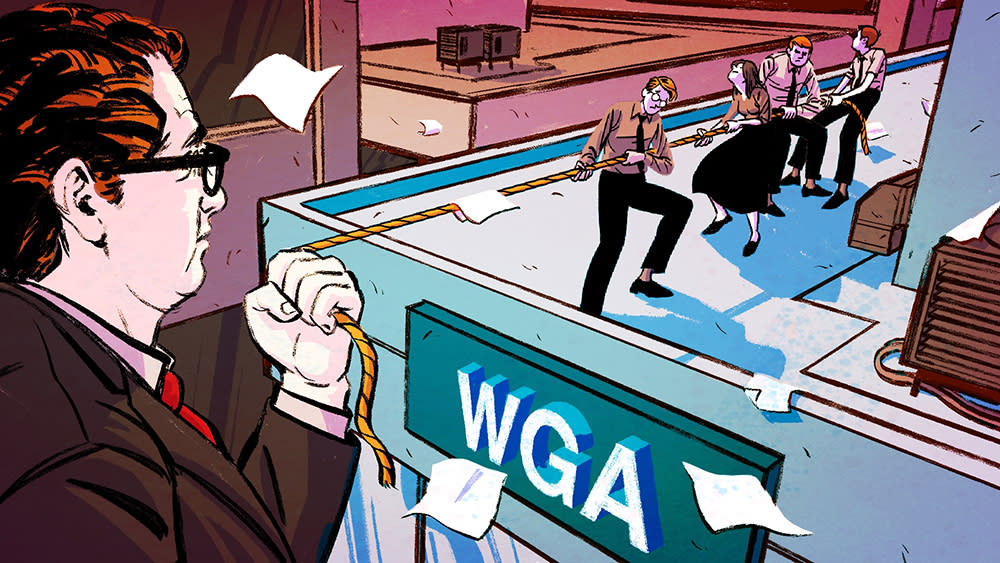WGA Backtracks After Hollywood Agents Slam ‘Impasse’ Claim

UPDATED: The WGA has backpedaled on its previous statement that negotiations between it and Hollywood agents are at an “impasse” after the ATA issued a letter rebuffing the claim that it was withdrawing from the talks.
Late Wednesday afternoon, Karen Stuart, executive director of the Association of Talent Agents, said in a letter to WGA leaders that she took issue with the characterizations made in recent public statements by the guild.
Related stories
WGA Presses Managers for Support as Talent Agency Battle Intensifies
Writers Guild, Bracing for Bitter Battle With Agents, Seeks Leaders
Writers Guild Declares It's 'at an Impasse' With Talent Agencies Over New Rules
In response, the WGA said it’s also ready to resume negotiations, with WGA West executive director David Young saying, “We are of course willing to meet. We hope to reach a new agreement.”
No date has been set for the next negotiation.
“Let us be clear,” Stuart said. “ATA has not withdrawn from negotiations and is committed to developing a new agreement. As you know, last Monday I sent a letter to you on behalf of each and every ATA member agency affirming our willingness to negotiate in good faith on each and every WGA proposal, requiring only the same good faith commitment from you. You have yet to respond to my letter, despite repeatedly promising to do so.”
Stuart sent the letter to Young and WGA West president David A. Goodman.
“ATA, on behalf of each and every member agency, remains ready, willing, and able to meet with WGA leadership and members at any time, and is prepared to engage with a full set of responses and counter proposals,” she said. “All we require is the WGA’s commitment that we are working toward the same goal. We owe it to our respective members to seek this common ground. Let’s pick a date and get back to work on a new agreement. We continue to await your response.”
Young said in his letter that the next step is for the ATA to offer a full set of responses and counterproposals and added, “Although ours is not technically a labor negotiation, we intend and promise to continue to negotiate in good faith, as that term is defined in American labor law: ‘To meet at reasonable times and confer in good faith with respect to . . . the negotiation of an agreement . . . but such obligation does not compel either party to agree to a proposal or require the making of a concession.'”
The moves came two days after Goodman announced to WGA members that the guild was at an impasse with Hollywood agents in negotiations over the new rules. The guild and the ATA have held two acrimonious sessions on Feb. 5 and Feb. 19 that only managed to raise the level of rancor. Goodman had predicted in the message that the agents would break off talks soon.
“The parties are at impasse,” Goodman added in the Mar. 5 message. “That happens in every negotiation where there are differences so strong that they can only be resolved by action away from the bargaining table.”
The WGA has been seeking to revamp the rules of engagement for agents with WGA members. The changes proposed by the WGA would effectively end all film and TV packaging deals, in which agencies receive both upfront and backend fees, and bar agencies from any financial interest in any entity or individual “engaged in the production or distribution of motion pictures.”
WME, CAA, and UTA in recent years have taken steps into content production and distribution, raising conflict of interest red flags in the view of many industry insiders. The WGA and the Association of Talent Agents are facing an April 6 contract expiration deadline to hammer out a new franchise agreement governing the rules for agents representing WGA members. The guild’s deal with the agencies hadn’t been touched since 1976.
The WGA has scheduled a Mar. 25 vote for members to implement its own code of conduct spelling out new rules, which would require members to fire their agents if they haven’t signed on to the code. It’s also posted inflammatory messages on the WGA West and WGA East sites.
“Our agents work for us,” the guilds wrote on their websites. “Every dollar they make must be generated as a percentage of the money we make. That is what it means to be our representatives and our fiduciaries. Agency-based studios and packaging fees make a mockery of that and are in violation of the agencies’ ethical and legal obligations to writers.”
“Putting things right does not blow up the business,” their statement said. “We do not owe our agents their wealth; they owe us their loyalty. That is what we pay for. In a complex, changing, yet immensely profitable time in our industry, writers need true allies, not deeply conflicted ones. It is for this idea — simple, old-fashioned and un-revolutionary — that we stand — and for which we come together as a guild again today.”
Sign up for Variety’s Newsletter. For the latest news, follow us on Facebook, Twitter, and Instagram.

